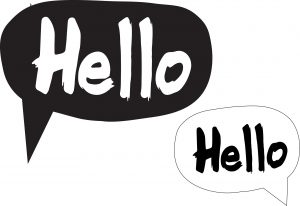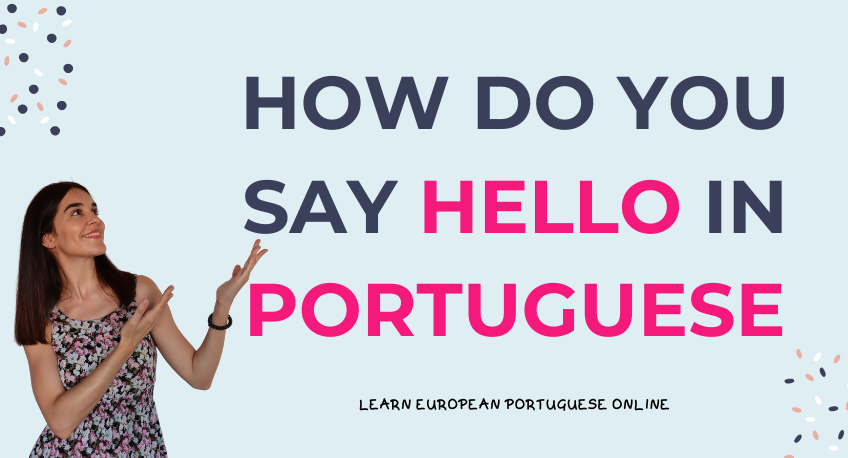 How to say hello in European Portuguese
How to say hello in European Portuguese
Hey folks! Long time no see… today I come to you to teach you how to say “hello” in Portuguese. You might think “But isn’t it just a simple word, and that’s it?” Well, not so fast…
In European Portuguese we have many different ways to greet one another. It can depend on the time of the day, if you want to be more formal or totally informal, and the different weight you are trying to put on that “innocent” greeting.
Ok, if you just want to learn the literal translation of the word “hello” in English, then I can tell you right away – it is “Olá”. However, if you want to know more about it, continue reading.
Depending on the time of the day:
So, depending on the time of the day we are – whether it is morning, afternoon, evening or night – we will adapt our way of greeting people.
In the morning (6h – 12h):
Bom dia!
This expression means “Good morning” and we use it as a form to say hello. We can also mix it with “olá”. We can say “Olá, bom dia!”. Actually, that is a really common way of saying it.
Please note that you can use “Bom dia!” also later in the day, but more in a general sense like “I wish you a good day” and not for saying hello.
During the day (12/13h – 19/20h):
Boa tarde!
This expression means “Good Afternoon” or “Good evening”, if it is already after 6pm. It can also be combined with “Olá”, as in “Olá, boa tarde!”.
At night (19h/20h onwards):
Boa noite!
This can mean hello if we are greeting someone that we see for the first time and it literally translates as “Good Evening”. Please note that it can also be used to say “Good Night” when you go to bed, but in that case is not related to saying hello.
Formal ways to say hello in Portuguese
 As I previously mention, if we are speaking to a person who we need to treat formally, we will have to use certain expressions that are considered more respectful and polite. Let us take a look at them:
As I previously mention, if we are speaking to a person who we need to treat formally, we will have to use certain expressions that are considered more respectful and polite. Let us take a look at them:
Bom dia!, Boa tarde! and Boa noite! – These three expressions that I have mentioned above are used to greet someone in a more formal way. If you want to be formal, choose this instead of the more simple “Olá”;
Como vai?
If you look this up in other websites and even the dictionary, you can soon understand that it literally translates into “How are you going?” or, put more simply, “How are you?”. However, many times we skip the “hello” part all together and we directly ask “How are you”. For us, this is already a way to say hello, because it is understood by both parts that this is what we mean. In fact, many times we are not even expecting an actual answer from the other person, but it is really just meant as a brief greeting. After saying it, you don’t expect for an answer, but you just keep going on with your life. You have done your job, and you keep moving =)
Como está?
This works exactly in the same way as “Como vai?”. Please see above.
Viva!
Sometimes we can also mix and match the expressions above with a brief “Olá” before – as in “Olá, como está?” or “Olá, como vai?”. We can also opt to add “Viva”, which is another way to say hello – as in “Viva, como está?” or “Viva, como vai?”. “Viva” literally means “Live”, but it is a greeting like in “God save”. It means you wish good health to the other person or people.
Informal ways to say hello in Portuguese
If we want to be informal and “normal”, like in everyday interactions with our friends and family, then we can use the following expressions to say hi:
Olá!
Once again, this is the literal translation of “hello” and it is very informal. We use it a lot and you will probably hear it all the time if you come to Portugal. Try to put the stress right at the end, in the “ó”, because otherwise you might sound a bit Spanish.
Olá pá!
This is really informal. “Pá” means something like “dude” or “pal”, so be sure to use it with your Portuguese friends to make them smile. They won’t expect it from you. Do not use it with anyone that is not your friend, though, or with a stranger, because this is really not polite. Ok with close friends, not ok with anyone else!
‘Tá tudo?/ ‘Tás bom?
These expressions are short for “Está tudo bem?” and “Estás bom”, respectively, and we use them also with friends only. It means something like “What’s up?”, so you see my point: it is only meant for close friends. It is fairly common to ask this also as a way to just say “hi”, not expecting any answer in return.
Tudo bem?
A bit less informal (or “slangish”) than “Tá tudo?” or “Tás bom?”, but still quite informal. You could use it with your family as well, though, unlike the two expressions above. It is also not expected that the other person answers, when used as a simple greeting. The other person can answer or not. Sometimes, two people even say “Tudo bem?” or any of the expressions above at the same time, not waiting for the answer and moving on with their lives. Get the picture?

And this is it for today. What of these expressions do you use the most when speaking Portuguese? Did you know them all?
Please let me know all about it in the comments section below. If you want to know more, drop me a line.
Beijinhos,
Mia


Old Mia,
Thank you for these daily extras to the course, it really keeps the mind focused, and is SO useful.
Suzanne
Olá Suzanne!
You are welcome! I am glad you are finding them useful!
Muito obrigada =)
Mia.
Olá not old , I know it’s not your fault it’s a typo but funny
I have been to Portugal a couple of times, and some years ago to Brazil as well. While in Portugal it was kind of possible to manage with English and a bit of Spanish I know, in Brazil it was not so easy!
So every time after my trip I have decided to learn at least some basics of Portuguese, but unfortunately it seems quite difficult for me. I didn’t study Spanish, but still somehow it’s much easier for me than Portuguese.
I guess for me the best way to learn it would be to live there for some time! I’ll definitely explore your site a bit more!
Hey Simo!
Thanks for your comment. Yes, Portuguese is a bit harder in terms of pronunciation. Spanish is a bit easier to understand, so I have been told and so I think as well, but please do not give up. The good thing is if you study Portuguese, you will understand Spanish almost immediately. The other way round is not so easy.
If you want to learn more about Portuguese pronunciation, please check European Portuguese Language Course – The Mimic Method. Maybe it will help you =)
Thank you again! And please DO come back to the website. I will be posting more materials and blog posts soon.
Mia
Hey it is very interesting that saying hello in Portuguese is very similar to spanish. I am just beginning to learn spanish and I have a ways to go.
And what is the difference with European Portuguese versus regular Portuguese? Quite frankly I didn’t even know there was a difference.
Thanks for the interesting and educational post!
Hi Sam!
Thank you for your comment. In fact, there is no such thing as “regular portuguese”. There is the language Portuguese with many different variants – European Portuguese is one of them. I call it European Portuguese because there is also Brazilian Portuguese (spoken in Brazil) and African Portuguese (spoken in Angola, Mozambique, etc). European Portuguese is the “original” Portuguese, let´s say, because it was here where it started. However, even this variant of Portuguese has suffered many alterations. If you want to know more about Brazilian vs. European Portuguese, you can check my other post.
If you have more questions, please do not hesitate to contact me again =)
Kind Regards,
Mia
I’ve been in Portuguese speaking countries several times. I visited Santos in Brazil when working on merchant ships. As I remember, it was no problems communicating in English. It is a seaport city and I mainly visited close to port areas. Unfortunately, in Setubal which is the beautiful town next to Lisbon, it was difficult to communicate and knowing at least basic phrases could help a lot. Is a phrase Olá pá! okay, when I’d like to ask for street directions?
Hi Andrej!
Thank you for your comment. In fact, “Olá pá” is a very informal way of greeting people, so I would not advise you to use it with strangers. You could use it with your close friends or relatives, as a more joking kind of greeting, but I would say you should avoid it in any other situation.
Hope that answered your question =)
Greetings,
Mia